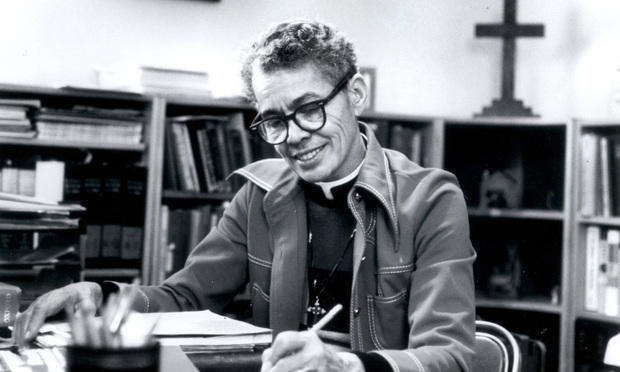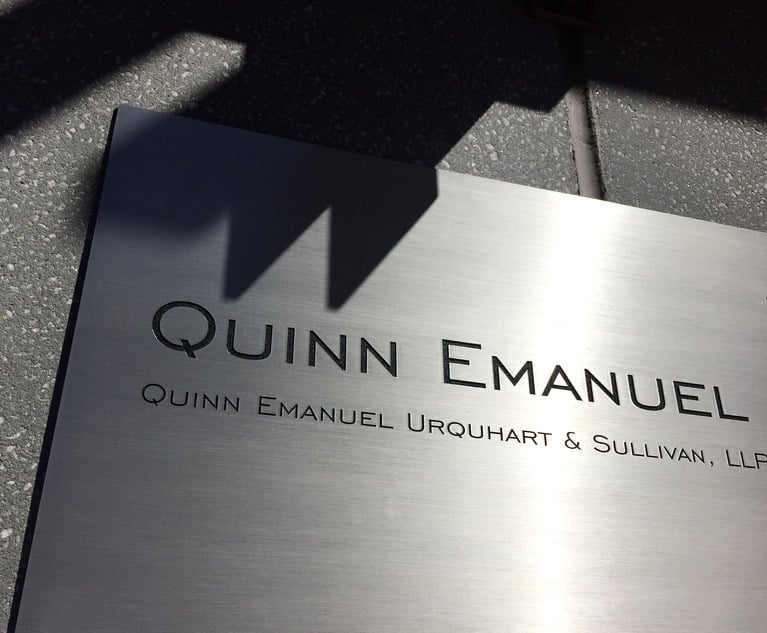Paul Weiss Sponsors Play About Civil Rights Trailblazer
A. Pauline "Pauli" Murray, a former associate at Paul, Weiss, Rifkind, Wharton & Garrison in New York, is the subject of a new Broadway production.
April 16, 2018 at 06:03 PM
4 minute read
 Pauli Murray.
Pauli Murray. A. Pauline “Pauli” Murray is the attorney, Episcopal priest and transgender, civil and women's rights activist of which you most likely have never heard.
Fifteen years before Rosa Parks refused to move to the back of a bus in Montgomery, Alabama, Murray was arrested for sitting in the whites-only section of a Virginia bus. She was the first woman admitted to Howard University's law school and graduated at the top of her class.
In its case before the U.S. Supreme Court in Brown v. Board of Education, the National Association for the Advancement of Colored People, represented by future U.S. Supreme Court Justice Thurgood Marshall, relied on arguments from Murray's law school seminar paper for their legal strategy.
In the 1950s, Murray became the only African-American and, after the departure of two women, the sole female lawyer at Paul, Weiss, Rifkind, Wharton & Garrison in New York, where she would briefly cross paths with then-summer associate Ruth Bader Ginsburg. Ginsburg would later attribute her argument in Reed v. Reed to Murray, which marked the first time the U.S. Supreme Court applied the Equal Protection Clause to sex discrimination.
This month, Paul Weiss, along with Duke University's Pauli Murray Project, is sponsoring a spring tour of “To Buy the Sun: The Challenge of Pauli Murray,” an original play by Lynden Harris. Performances of the play, which explores Murray's life and place in history, took place at St. Paul's Chapel in New York and Yale University. The production will make its final run Tuesday at Howard University.
“It's such a part of the Paul Weiss story,” said Paul Weiss private funds partner Amran Hussein, who also serves as co-chair of the firm's diversity committee.
The firm's involvement in sponsoring the play's spring tour came about through its work with an effort by Duke to have Murray's family home in Durham, North Carolina, designated a national historical landmark. Shortly thereafter, Paul Weiss met up with the Pauli Murray Project to further discuss how both could collaborate to preserve and educate others on Murray's legacy.
Within the firm's archives are letters and correspondence written by Murray, as well as interviews with those at Paul Weiss, such as longtime partner Arthur Liman, former chief counsel of the special U.S. Senate committee investigating the Iran-Contra affair.
One letter, in particular, Hussein highlighted is one that Murray wrote to Simon Rifkind, a now deceased senior partner at the Am Law 100 firm.
“I often think of you and the model of professional excellence you represented to me when I was an associate in the bullpen of the litigation department. You will never know how much it meant to me … ” Murray wrote. “This note is to thank you for this experience and to say how gratified I am to learn that Paul Weiss is taking on five women associates in 1969.”
Hussein said that Paul Weiss remains committed to spreading the word about Murray and her accomplishments, especially within the legal profession.
“There were just so many firsts with her,” Hussein said. “I think it's sad that we still have to go through so many firsts, but it's the openness of [Paul Weiss] from the very beginning to inclusion. I'm standing on her shoulders without even knowing it.”
This content has been archived. It is available through our partners, LexisNexis® and Bloomberg Law.
To view this content, please continue to their sites.
Not a Lexis Subscriber?
Subscribe Now
Not a Bloomberg Law Subscriber?
Subscribe Now
NOT FOR REPRINT
© 2025 ALM Global, LLC, All Rights Reserved. Request academic re-use from www.copyright.com. All other uses, submit a request to [email protected]. For more information visit Asset & Logo Licensing.
You Might Like
View All
Saul Ewing Loses Two Partners to Fox Rothschild, Marking Four Fla. Partner Exits in Last 13 Months
3 minute read
Willkie Adds Five-Lawyer Team From Quinn Emanuel in Germany

Dentons Taps D.C. Capital Markets Attorney for New US Managing Partner

Exceptional Growth Becoming the Rule? Demand Drove Strong Year for Big Law
Trending Stories
- 1States Accuse Trump of Thwarting Court's Funding Restoration Order
- 2Microsoft Becomes Latest Tech Company to Face Claims of Stealing Marketing Commissions From Influencers
- 3Coral Gables Attorney Busted for Stalking Lawyer
- 4Trump's DOJ Delays Releasing Jan. 6 FBI Agents List Under Consent Order
- 5Securities Report Says That 2024 Settlements Passed a Total of $5.2B
Who Got The Work
J. Brugh Lower of Gibbons has entered an appearance for industrial equipment supplier Devco Corporation in a pending trademark infringement lawsuit. The suit, accusing the defendant of selling knock-off Graco products, was filed Dec. 18 in New Jersey District Court by Rivkin Radler on behalf of Graco Inc. and Graco Minnesota. The case, assigned to U.S. District Judge Zahid N. Quraishi, is 3:24-cv-11294, Graco Inc. et al v. Devco Corporation.
Who Got The Work
Rebecca Maller-Stein and Kent A. Yalowitz of Arnold & Porter Kaye Scholer have entered their appearances for Hanaco Venture Capital and its executives, Lior Prosor and David Frankel, in a pending securities lawsuit. The action, filed on Dec. 24 in New York Southern District Court by Zell, Aron & Co. on behalf of Goldeneye Advisors, accuses the defendants of negligently and fraudulently managing the plaintiff's $1 million investment. The case, assigned to U.S. District Judge Vernon S. Broderick, is 1:24-cv-09918, Goldeneye Advisors, LLC v. Hanaco Venture Capital, Ltd. et al.
Who Got The Work
Attorneys from A&O Shearman has stepped in as defense counsel for Toronto-Dominion Bank and other defendants in a pending securities class action. The suit, filed Dec. 11 in New York Southern District Court by Bleichmar Fonti & Auld, accuses the defendants of concealing the bank's 'pervasive' deficiencies in regards to its compliance with the Bank Secrecy Act and the quality of its anti-money laundering controls. The case, assigned to U.S. District Judge Arun Subramanian, is 1:24-cv-09445, Gonzalez v. The Toronto-Dominion Bank et al.
Who Got The Work
Crown Castle International, a Pennsylvania company providing shared communications infrastructure, has turned to Luke D. Wolf of Gordon Rees Scully Mansukhani to fend off a pending breach-of-contract lawsuit. The court action, filed Nov. 25 in Michigan Eastern District Court by Hooper Hathaway PC on behalf of The Town Residences LLC, accuses Crown Castle of failing to transfer approximately $30,000 in utility payments from T-Mobile in breach of a roof-top lease and assignment agreement. The case, assigned to U.S. District Judge Susan K. Declercq, is 2:24-cv-13131, The Town Residences LLC v. T-Mobile US, Inc. et al.
Who Got The Work
Wilfred P. Coronato and Daniel M. Schwartz of McCarter & English have stepped in as defense counsel to Electrolux Home Products Inc. in a pending product liability lawsuit. The court action, filed Nov. 26 in New York Eastern District Court by Poulos Lopiccolo PC and Nagel Rice LLP on behalf of David Stern, alleges that the defendant's refrigerators’ drawers and shelving repeatedly break and fall apart within months after purchase. The case, assigned to U.S. District Judge Joan M. Azrack, is 2:24-cv-08204, Stern v. Electrolux Home Products, Inc.
Featured Firms
Law Offices of Gary Martin Hays & Associates, P.C.
(470) 294-1674
Law Offices of Mark E. Salomone
(857) 444-6468
Smith & Hassler
(713) 739-1250










